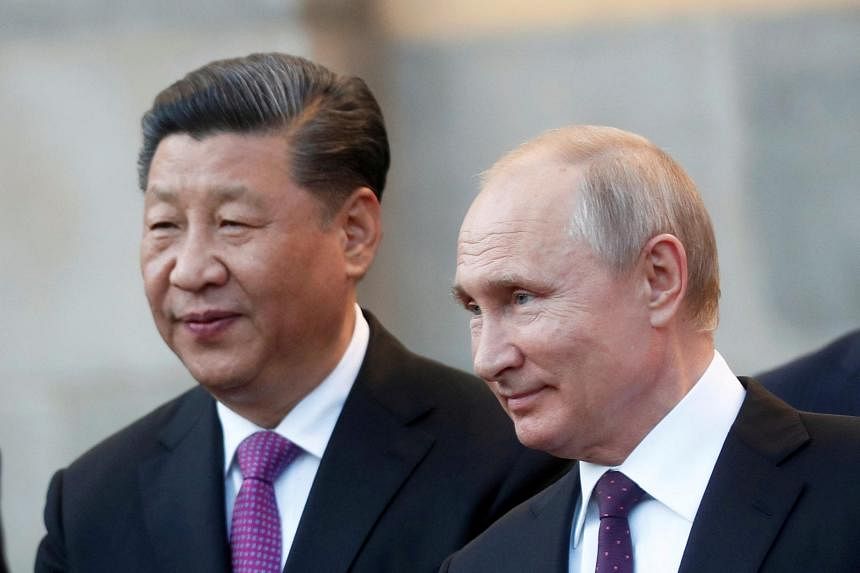BEIJING - As the war in Ukraine drags into its third year, strategic ties between Beijing and Moscow have continued to deepen – a trend that is set to continue, said analysts.
Not only did Sino-Russian trade hit a record high of US$240 billion (S$320 billion) in 2023, exceeding expectations, but the neighbours have also signalled greater geopolitical alignment in recent months.
In an annual press conference at the Two Sessions parliamentary meetings in Beijing on March 7, China’s Foreign Minister Wang Yi declared that the two major powers have created “a new paradigm of great power relations that is completely different from that of the old Cold War era”.
“The fact that Russian natural gas enters thousands of homes in China and Chinese cars are running on Russian streets and alleys fully reflects the strong resilience and broad prospects of the mutually beneficial cooperation between the two countries,” added Mr Wang.
He described developing the relationship as “a strategic choice made by the two sides based on the fundamental interests of the two peoples”, in response to a question by the Russian state-owned Sputnik News Agency.
China had to walk a diplomatic tightrope when Russia invaded Ukraine in late February 2022. While supporting its close partner Moscow, it had to factor in the reaction of the United States and allied European countries, which have tightened economic sanctions against Moscow.
But the unofficial alliance has only strengthened, especially over the past year as the war reached a stalemate. Observers believe Moscow is now betting on outlasting Kyiv and its Western supporters.
In 2019, China and Russia had agreed to increase bilateral trade to US$200 billion by 2024, but this was well surpassed in 2023.
Russia overtook Saudi Arabia to become China’s largest oil supplier in 2023, with Beijing buying more Russian oil and gas at discounted prices. In turn, Moscow has bought more Chinese manufactured goods from cars to smartphones as US and European brands left the Russian market.
Deepening bilateral cooperation under Chinese President Xi Jinping and Russian President Vladimir Putin – who have met 42 times in the past decade – shows no signs of abating.
During their most recent meeting in Beijing in October 2023, Mr Xi told Mr Putin that the relationship was not one of expediency but “a long-term commitment”. He said China will work with Russia to add “new dimensions to their practical cooperation” in the 75th year of their establishment of diplomatic ties in 2024.
Political scientist Zhang Junhua said that in Mr Xi’s calculations, the military might of Ukraine and its Western backers has not proved superior enough for him to consider scaling back his support for Mr Putin.
“Mr Xi’s strategy is clear: Formally, Beijing claims to be neutral, but de facto, it supports Mr Putin. Beijing’s desire is to let Mr Putin win the war; Mr Xi’s bottom line is not to let Mr Putin’s Russia collapse,” said Dr Zhang, a senior associate at the European Institute for Asian Studies, a policy and research think-tank in Brussels.
Dr Liu Minran, an international relations lecturer at the University of Sydney, said that Russia remains dependent on China, and Beijing’s interests with Russia go beyond the war to goals including bolstering its international influence.
“Any action perceived to be siding with the West will undermine China’s overall effort to become another pole in this changing international system, or even to be on an equal footing with the US,” said Dr Liu, who specialises in China’s defence and foreign policy.
But Associate Professor Hoo Tiang Boon from Nanyang Technological University noted that there are limits to China’s backing of Russia.
“China wants to have its cake and eat it too. It wants to pursue cooperation to benefit from Russian technology, but it is also careful to avoid falling under the net of Western sanctions,” said Prof Hoo, an expert on Chinese security and foreign policy.
He pointed to recently announced sanctions by the European Union to blacklist Chinese companies for the first time over their connections to Russia’s defence and security sector.
On both the Ukraine and Gaza wars, Mr Wang at the press conference on March 7 called for peace talks as soon as possible, while mostly reiterating China’s positions and peacemaking efforts.
Chinese efforts include an ongoing round of shuttle diplomacy on the Ukraine conflict by its special representative on Eurasian affairs Li Hui, who has covered Russia and Poland, and is expected to visit Ukraine, France, Germany and Belgium next.
Prof Hoo believes Mr Li’s trip is primarily a fact-finding one, to help ensure that China retains some influence in the peacemaking process.
“From the Chinese perspective, they have probably concluded that a cessation of hostilities is in China’s best interests – but only insofar as whatever peace that emerges is one that does not jeopardise the Putin regime.”


